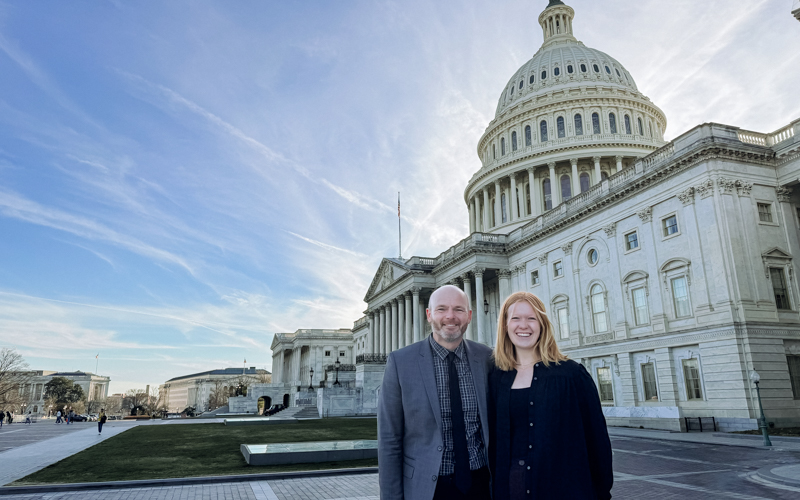January 25, 2024
The Center for Public Justice awarded the undergraduate student and faculty pairing $6,500 to research the impact of federal emergency allotment programs in Chicagoland throughout the pandemic.

Ream’s research will focus on SNAP (Supplementary Nutritional Assistance Program) and WIC (Special Supplemental Nutrition Program for Women, Infants, and Children), emphasizing the strain placed on families and child welfare services when these programs ended in March 2023. The research report, slated for publication in September, will also include a theological perspective on Christian engagement with public policies supporting food security and child welfare.
Ream, a Bible/theology major, encourages students to initiate projects like this that they’re passionate about, even if the subject matter is considered outside their realm of study. Wheaton College’s liberal arts curriculum provides an ideal space for this interdisciplinary engagement.
“The liberal arts are a really cool thing,” said Ream. “Seeing the combination of everything—data advocacy, policy, theology—all coming together makes me realize that a lot of the stuff I’ve learned in my classes at Wheaton is applicable.”
The Center for Public Justice is a nonpartisan, Christian organization dedicated to civic education, leadership development, and policy shaping to serve God and advance justice for the transformation of public life. The Hatfield Prize is awarded annually to three student-faculty pairs across the country. The prize is named after the late Oregon Senator Mark O. Hatfield, who was known for integrating his Christian faith with his public policy commitments.
According to Ream, Johnson’s Christian Ethics course completely changed the way she thought about her career and how one lives and works as a follower of Christ. Johnson’s own recent research on the theology of the German Confessing Church Movement—a movement within Protestantism that resisted Hitler’s attempts to unite all Protestant churches into a single pro-Nazi church—has helped inform Ream’s interests, too. Approximately a third of the report is a theological approach to the issue, drawing from sources such as German theologian Dietrich Bonhoeffer and his writings about the value of human life in World War II.
“This is very much a partnership of equals, and I have learned a lot from her,” said Johnson. “This prize is a testament to Addison’s hard work. Addison embodies the best traits of a Wheaton student. She’s intellectually gifted, curious, hard-working, and persistent, but she also wants to use her knowledge and skills to serve others. This project isn’t about her. It’s about using what she’s learned to help children and families.”
Ream cites the joy of sharing dinner with family as a key motivator behind her project, as well as her experiences in high school. In her school, seniors were permitted to go off campus for lunch. Many of Ream’s friends, however, relied on the free-and-reduced lunches her school offered. In response, Ream’s mother often prepared lunch for her whole friend group so they all could go off campus and share a meal together.
“Those moments have really stuck with me because of how much conversation and community happens around a table, sharing a meal together, which is a very Christian principle,” said Ream. “For families that have to work overtime to make ends meet to just give their kids food to survive, something has to be done about that. Parents and their children should be able to eat together, to have that time and those resources.”
Both Ream and Johnson do not see the work of public policy and theology as being far removed from one another.
“The way in which we care for others and speak of others, our actions, where our money goes, it is one-hundred percent a Christian ideal and should be influenced by my theology,” said Ream.
“Theology teaches us what it looks like to live a flourishing life with Christ, and it empowers us to help others live that same kind of life,” said Johnson. “Christians are people who seek justice, especially for the most vulnerable members of our society. Addison is putting her liberal arts learning into action to help churches seek justice in the Chicago community.”
—Grant Dutro